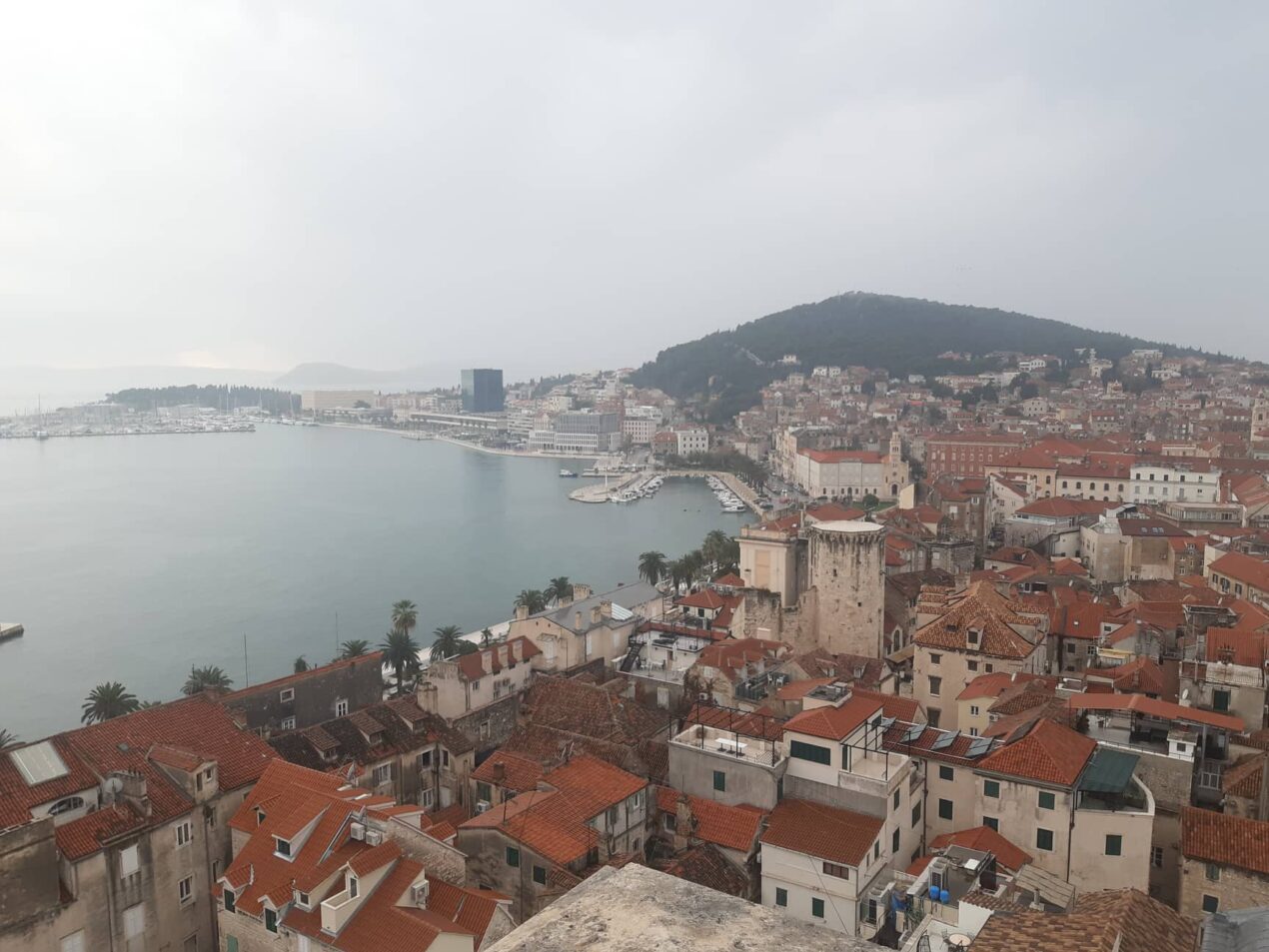Croatia’s Legal Drinking Age as Explained by a Karlovačko-Loving Guy
Moving to Croatia for three months in the dead of winter was completely unexpected for this Big Body. I hadn’t thoroughly thought out my then year in Europe and was, of course, required to leave the Schengen Region after 90 days (this was before Croatia joined the Schengen Area in January 2023). Either way, in the middle of winter in Zagreb and Split, Croatia, one of the only things I could do was drink. And drink I did (Karlovačkos for the win).
From hole-in-the-wall pašticada (a popular braised beef dish) haunts where I’d inevitably get talked into shots of rakija with the bartender, to cozy Zagreb wine bars with the woman I was (then) dating, honey-infused craft beers with cevapis (an absolute must if you travel to Croatia), and shots of slivovitz with one of my best friends when he somehow found himself crashing on my couch, I was more than pleasantly surprised by Croatia’s drinking Rolodex and scene.
Note: Unfortunately, I’m not cool enough to pop champagne bottles on any of those yachts in the Adriatic but I’d be remiss not to mention that is another storied Croatian booze pastime.
With Croatia having become almost the de facto Balkan destination for travelers and a digital nomad’s dream (thanks to the introduction of the digital nomad residence permit launched in 2021), a question that might pop up if you’re planning on doing a gap year there, from a country like me (the U.S.) where the drinking age is still the dreaded ‘21’, or heading over with family, is ‘What is the legal drinking age in Croatia?’.
Here’s a bit about Croatia’s drinking age and culture and what I loved about my time living in Split, Croatia.
What is the Legal Drinking Age in Croatia?
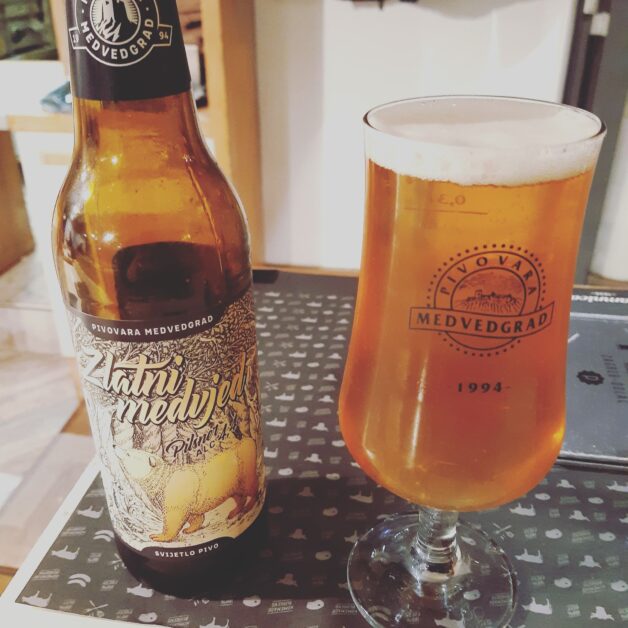
If you’re 18, you’ll get to drink beers like this beautiful one all day, every day.
The drinking age in Croatia is 18 years old. Unlike the United States (my home country) where the drinking age is 21, Croatia’s drinking age is on par with other countries across Europe and about half of the countries in Asia. I’m currently based in Hong Kong, which modeled its legal drinking age after the United Kingdom and is also 18 years old.
Simply put, Croatia does not allow the purchase or sale of alcoholic beverages to anyone below the age of 18. This also includes providing or giving alcoholic drinks (for free) to those under 18. However, this distinction doesn’t exactly mean that consuming alcohol below 18 is off the table completely in Croatia.
Croatia Drinking Age in Restaurants With Parents
Croatian law allows individuals under 18 years old to drink alcohol in the privacy of their own homes and restaurants when accompanied and supervised by their parents. Theoretically, this means that the legal age for consumption in Croatia could be whatever a parent is comfortable with.
I know in many countries, it isn’t unheard of at a young age to have a parent pour you a tiny bit of wine with dinner.
Do They Check Your ID When Buying Alcohol in Croatia?
As Croatia prohibits the sale, gifting, and serving of alcohol to individuals under the age of 18, restaurants, bars, and nightclubs may refuse to sell or serve alcohol if a patron fails to provide them with a valid ID (license, passport, or other government ID) showing that they are 18 years or older.
In my experience living in both Split and Zagreb over 3 months, unless the establishment was a popular nightclub, most establishments won’t explicitly ask to check your ID. However, if you look young (I had a chronic baby face until 25), you may be at an increased chance of shop vendors, supermarket cashiers, and bartenders asking to check your ID.
Split’s promenade is a hotspot for nightlife and you will almost always find bouncers positioned outside of every major club checking IDs, which surprised me the first time I tried to enter. My best friend had flown down from Poland and somehow, his ID burrowed deep in his luggage so he thought he could get away without bringing it out for our nights “on the town” in Split. He was put in his place real quick and denied entry.
When buying alcohol at the SPAR supermarket near me and other local bottle shops, I was never asked to provide identification. Then again, I was roughly 28 to 29 years old at the time and had a receding hairline that would make your grandfather feel proud of his remaining hair.
However, I’m not advocating that you leave your ID at home. On the contrary, I always recommend bringing it with you wherever you go – as on the “off chance” that you are ID’ed, you don’t want to have to run all the way home and kill the momentum of the night.
How Strict is the Drinking Age in Croatia?
What I do think Europe has done far better than the United States is normalizing alcohol consumption at an early age in a way that doesn’t lead to absurd alcohol binges at 21 to “make up for lost time.” Granted, there are some outliers across the globe but overall, I’ve found European countries’ more relaxed approach to alcohol consumption to be effective in promoting a more level-headed approach to drinking.
My point is that Croatia isn’t as strict as the United States when it comes to enforcing the minimum drinking age of 18. Further, the fact that minors can consume alcohol in private and restaurants under the supervision of their parents points to a less strict approach to enforcing the drinking age.
There are still consequences that underage drinkers may face in Croatia, which I tackle in the next section.
Pale Ale Travel Tip: If you’re in Split, Croatia, and looking to get some work done, make sure to check out my post breaking down my favorite coffee shops in Split.
Croatian Drinking Laws You Should Know
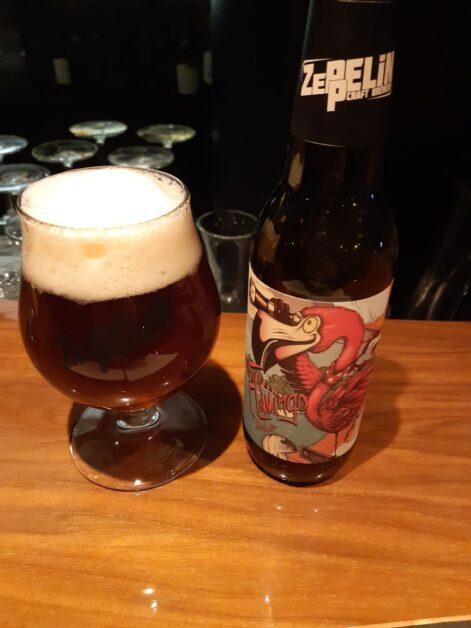
This was from my last night in Zagreb at the Latin American steakhouse ‘El Toro’.
There are several key Croatian drinking laws both tourists and locals should keep in mind in “the land of a thousand islands.”
Consequences For Underage Drinking in Croatia
If you’re caught underage drinking in Croatia, you may face serious fines that could ultimately leave you out of pocket for the rest of your trip. Most fines for underage drinking in Croatia range from roughly £50 to £300, depending on the nature of your drinking infraction and location. However, some can even go as high as £700. I don’t know about you but that’s a lot of money that I don’t have.
Further, for locals and study abroad students, universities and schools across Croatia also typically have alcohol-related policies which may be enforced if you are caught underage drinking in Croatia (as a tourist or local).
Drunk Driving: What is the Blood Alcohol Limit For Driving in Croatia?
Croatia once implemented a zero-tolerance alcohol policy across the board for drinking and driving, meaning that a blood alcohol content (BAC) percentage over 0% would result in fines, driving bans, and even imprisonment. However, the BAC limit for drivers 25 years or older was increased to 0.5g/l. This equates to roughly one standard drink per hour for the average-sized person. Both novice and professional drivers under the age of 24 are still subject to a zero-tolerance BAC limit (0%).
This is especially an important drinking law to keep in mind if you decide to rent a car while traveling through Croatia. As an American, who is used to the typical BAC limit of 0.08% (even below the age of 25) for driving, Croatia’s zero-tolerance limit is definitely something that would catch me off guard.
Drunk drivers can face having their license revoked, prison sentences, and fines ranging from £400 to £2,666. And for repeat offenders, they may find themselves being held in detention for up to 12 hours in order to sober up, with subsequent imprisonment also more likely.
Cyclists with a BAC above 0.5g/l may also face fines (starting at £66).
Croatia has made a concerted effort to crack down on drunk driving over the years, specifically rolling out (a) regular roadblocks and checks to identify drunk drivers, and (b) national drink and drug educational campaigns.
Pale Ale Travel Tip: Prices have undoubtedly increased since my time in Croatia, however, for a starting point on what you can expect to pay for a centrally located apartment in Split, make sure to check out my article ‘How Much Does It Cost to Rent a Luxury Apartment in Split, Croatia?’.
Is Public Drinking Legal in Croatia?
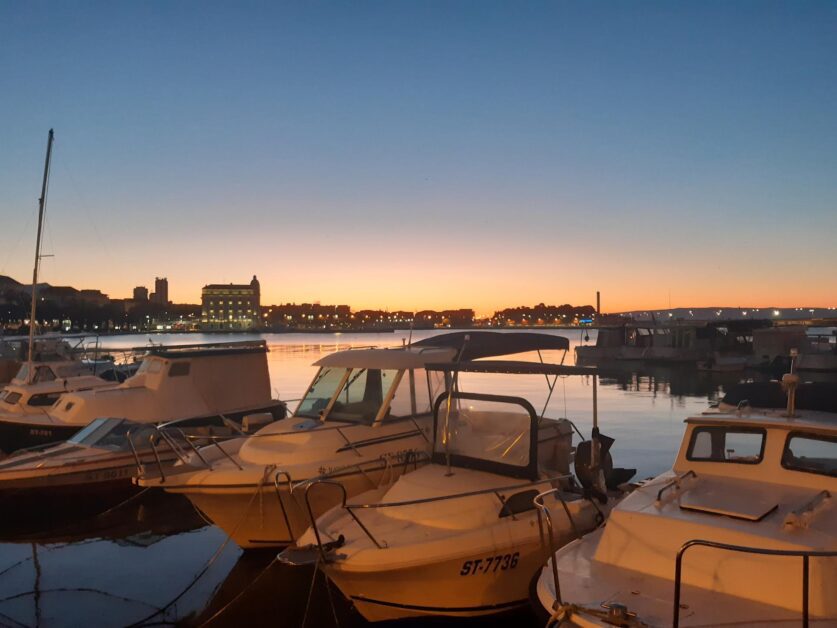
This is just a few steps away from where all the old dawgz would throw back beers at all hours of the day in Split.
Yes and no. Public drinking in Croatia is technically illegal, however, this is rarely enforced. The general rule when it comes to public drinking in Croatia is that if you are openly intoxicated and causing a public disturbance, you may then face legal repercussions. However, if you want to have a few cold ones while at the beach or in the park, you really don’t have much to worry about.
This also depends on the area of Croatia you are in. For example, in 2017, the popular summer resort island ‘Hvar’ (just a stone’s throw away from Split and Dubrovnik) implemented fines of up to £700 for public alcohol consumption due to the high number of unruly British tourists that were terrorizing the island.
I lived right off of Sinovčića Street in Split, Croatia (just a five-minute walk from the Promenade) and would encounter old Croatian men out on the street drinking from morning until night. This was especially true the closer you got to the water on Trumbićeva Obala as there was a beer shop and small supermarket that was somewhat of a hotspot for locals to hang out and crush beers on the adjacent benches.
One crazy thing that happened while I was living in Split was that one morning I woke up to what I thought was the breaking of bottles in rapid succession (which wasn’t unheard of us), only to find out that a triple murder had occurred not too far outside of my doorstep (I was also weirdly interviewed about this by a Croatian news reporter but am unsure where it ended up). If you’re curious about the event in question, here’s a link to a news article on it.
Getting rowdy in the streets of Split while drinking beer, rakija, and other spirits from dawn until dusk didn’t seem like it was particularly cracked down on.
However, the times may be changing as in 2022 the city of Split voted to begin fining offenders who consume alcohol within a historical center, 100 meters from schools or kindergartens, and in public spaces where “dirty traces” can be left. Fines start at £150 and go up to £300 depending on the location and nature of the violation.
IMPORTANT: I have seen a lot of talk online about simply “not paying the fine” if you live in a different country. If you ever plan on returning to Croatia or if you just want to be a decent human being, pay the fine and move on – I’m a big advocate of respecting the laws and rules of the country you travel to.
My Favorite Alcoholic Drinks to Try in Croatia
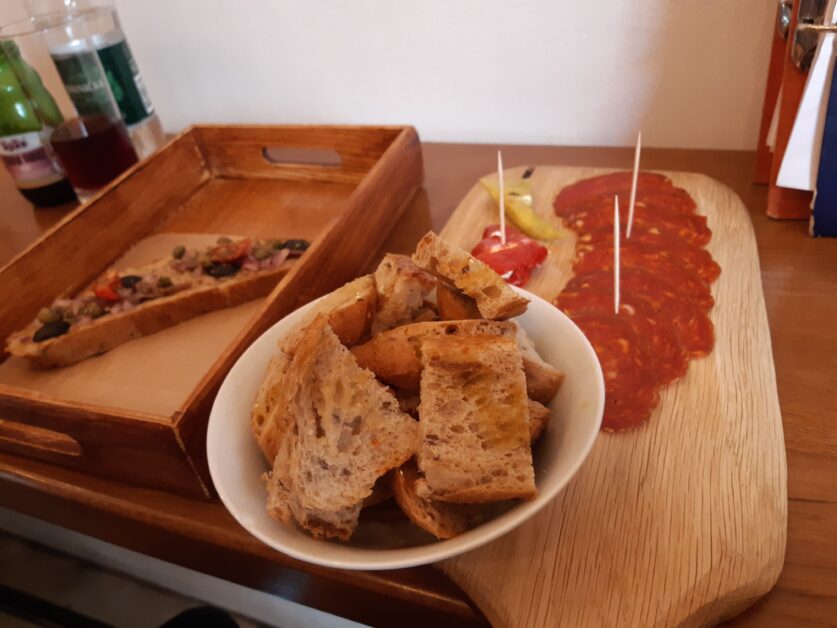
Not pictured: the three glasses of Graševina I drank with this.
As one of my best friends growing up was from a Croatian household, I was exposed to Croatian alcohol way before I had even moved there. Having spent three months in Split and Zagreb, here are several of my favorite alcoholic drinks that I recommend trying:
- Beer:
- Karlovačko turned out to be what I consider one of the most drinkable lagers I’ve ever tried. It’s a subsidiary of Heineken International and you can find these green and red bad boys in almost every supermarket, bottle shop, and bar.
- Pivovara Medvedgrad became one of my favorite craft beers to throw back while in Croatia. It’s Zagreb-based and if you decide to grab a cold one, the ‘Golden Bear Pils’ is a must.
- Zeppelin Craft Brewery is behind one of my favorite ambers (based on traditional American ambers), ‘Flamingo’, a sub-5% somewhat bitter yet fruity ale.
- Wine:
- Prošek: A great dessert wine that became a go-to for me to round out my meals. It’s roughly 15% alcohol and boasts a somewhat complex profile that ranges from creamy and jammy to nutty and even spicy. Also, it’s not related to the Italian Prosecco in any way, shape, or form.
- Graševina: A white wine and grape grown more inland in Croatia which is citrusy, fruity, and floral. It is one of Croatia’s go-to white wines (Welschriesling) as the now global Graševina market was said to have originated in Croatia (or the Danube Region). This was a favorite of mine to pair with pork and various cold-cut platters I’d consume in Zagreb.
- Plavac Mali: This is somewhat of the ‘control’ red wine (and similar to Zinfandels) across Croatia as it’s the primary red wine grape grown in the country (especially the Dalmatian Coast). As you can see, since I spent more time in Split, I went heavy on drinks popular on the coast.
- Babic: A full-bodied red wine made from blue-skinned wine grapes also grown on the Dalmatian Coast. My palate isn’t refined enough to have picked up on the differences with the Plavac Mali at the time as I found them to be somewhat similar in taste.
- Spirits & Liqueur:
- Slivovitz: This was always a staple and something you would find in my best friend’s liquor cabinet, so it was no stranger to me when I arrived in the Balkans. Little did I know just how much I’d actually consume of it during my three months there. This fruit brandy (plum) is a jammy, plummy, and fruity spirit that will definitely burn the throat when going down.
- Rakija: This most popular spirit in Croatia. This fruit brandy (often plum) in the Balkans is typically 40% ABV (this is a strong drink) and consumed in small glasses. On the Dalmatian Coast you’ll run into some ‘herbier’ (Travarica) and ‘floral’ rakija concoctions which were not my favorite.
- Maraschino: Coming from, you guessed it, cherries, this is a popular liqueur from the Dalmatian Coast with a far sweeter and nuttier flavor profile than sour.
- Pelinkovac: This might be my least favorite on the list as I’m not a huge ‘herbal liqueur’ guy. However, your tastes may be different. Pelinkovac is a wormwood post-meal digestif with an extremely bitter taste that is touted for its medicinal properties.
I know the above is only a fraction of Croatia’s alcohol landscape, so I’d love to hear some of your favorites in the comments!
Pale Ale Travel Tip: One of my favorite places I spent time in while living in the Balkans was Mostar, Bosnia. I wrote this ‘Mostar Travel Itinerary’ with everything I loved about the city which I’d recommend checking out. I also wrote a short guide on getting from Split to Mostar by bus (which is the typical route most travelers take).
Final Questions About Drinking in Croatia
While the below answers might seem like common sense (or already answered), let’s just run through things with explicit ‘yes’ or ‘no’ answers to clear up any confusion.
Can You Drink Alcohol at 16 in Croatia?
No. The minimum legal drinking age in Croatia is 18. However, if you are with your parents and under their supervision at home or in a restaurant, then there is a chance you may be able to drink alcohol if you’re 16.
Pale Ale Travel Tip: If you find yourself in Zagreb, make sure to check out my post breaking down one of my favorite cevapi joints in the country – Plac Kitchen & Grill.
What is the Legal Drinking Age in Split, Croatia?
The legal drinking age in Split, Croatia is the same as the rest of Croatia – 18.
What Age Can You Legally Go Clubbing in Croatia?
Entry into a club where you can consume alcohol is 18 years old in Croatia.
Is the Legal Drinking Age in Croatia Different For Foreigners?
No. Foreigners must follow the same legal drinking age as everyone else when traveling or moving to Croatia.
Be Respectful While Drinking in Croatia
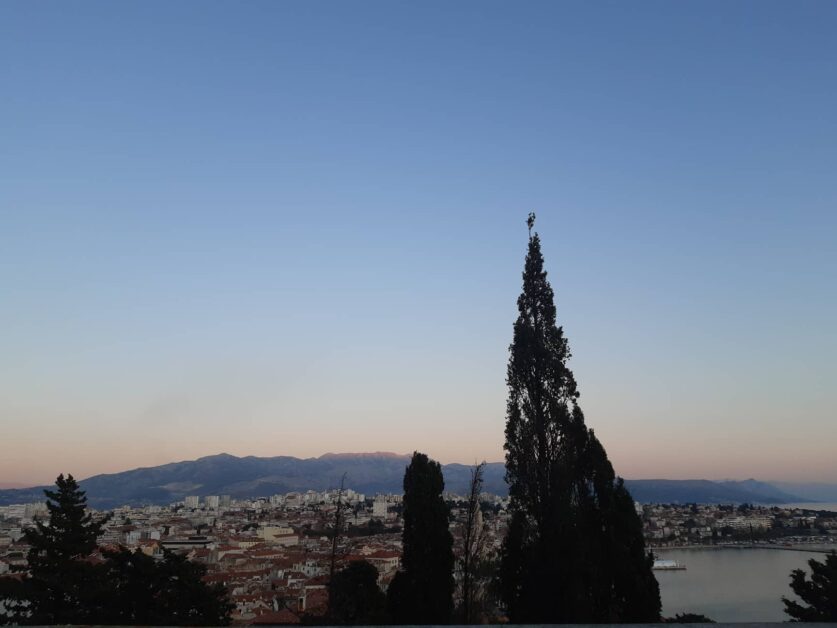
One of my favorite perches to have a beer and coffee in Split (Teraca Vidilica).
My biggest word of warning is just because a country is more relaxed than your country back home when it comes to the drinking age (or enforcing it), doesn’t mean that you should engage in reckless behavior (such as binge drinking or starting fights).
Unfortunately, a lot of poorly behaving tourists over the last several years have led to crackdowns on what were relaxed drinking cultures so I recommend approaching your consumption with even more caution. I usually defer to the locals and aim to behave and mirror how they are (minus the outliers).
As the legal drinking age in Croatia is 18, it is best to respect this law, otherwise, you may face legal repercussions which could ruin your travels or stay (especially if you get slapped with a fine). Also, avoid driving while intoxicated and use a rideshare app like Bolt, Uber, or Cammeo.
Finally, if you have any questions about traveling to Croatia or spending an extended period in the Balkans, please don’t hesitate to reach out to me in the comments or via email (info@palealetravel.com).
Drink well (and responsibly) everyone,
Big Body
Big Body is a voracious lov…eater, a cowardly fighter, and a self-proclaimed curry goat BBQ-eating champion (don’t forget the donkey milk) who likes Stoicism, baseball, and writing in the third person. Having worked for himself for the last 7 years, he isn’t particularly successful but he does still drink ice-cold Sapporo draft beers with the best of them and knows his way around a Dai Pai Dong or two. He is based in Hong Kong but you can still find him in Saigon, Osaka, and Vienna for extended periods.
